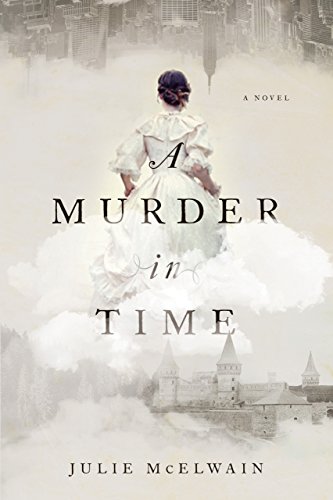I’ve made a tradition of writing about “haunting books” on this blog each October, though last year I combined my list into a single post. This year, I’m going to try to write about a book that haunts me (stays with me after I’ve read it) each Monday through the month.
 As I selected books to write about, I noticed that many of them haunted me because of how they dealt with time. My first “haunting book” this month is A Murder in Time, by Julie McElwain. This book might not haunt a lot of readers. On one level, it’s simply a time-travel fantasy. On another level, it’s simply a murder mystery.
As I selected books to write about, I noticed that many of them haunted me because of how they dealt with time. My first “haunting book” this month is A Murder in Time, by Julie McElwain. This book might not haunt a lot of readers. On one level, it’s simply a time-travel fantasy. On another level, it’s simply a murder mystery.
But the book haunted me because I reflected as I read on how the author had to deal with same issues in writing about other times that I do in my historical fiction—but she got to be more overt about it, because her protagonist was a 21st century woman dumped into the early 19th century.
I read this book because my local library, the Mid-Continent Public Library, participated in a Big Read a few months ago through the Overdrive ebook service. McElwain’s book was selected as the Big Read book. I like the idea of community members all reading the same book, and I’ve tried to read many of the Big Read books the library has suggested in the last few years. Some I’ve really enjoyed, and others I haven’t been able to finish.
I like thrillers, and I like time-travel romances (one of the few forms of fantasy that does appeal to me—you can keep your vampires, werewolves, and most intergalactic aliens to yourself, thank you), so I thought I would like A Murder in Time. However, through the first few chapters, I wondered if this might be one of the books I couldn’t finish.
The novel begins as a typical shoot-em-up thriller with a gunfight in the 21st century in which the protagonist, Kendra Donovan, a young female FBI profiler, is injured. After she recovers, Kendra goes off to England to follow a bad guy, travels through a hidden portal in an English mansion, and abruptly finds herself in that same mansion in 1815. Only her wits will keep her alive—first simply to survive in a strange environment, and later to solve a series of murders that occurs around the mansion.
Despite the action, the first part of the book was boring, and there were also some slow parts later in the book. It wasn’t great literature, and a lot of the Goodreads reviews of the book point out its flaws. But ultimately I became engrossed in the plot.
As I got into A Murder in Time, I started thinking about the relative values of creature comforts and career options on the one hand and love and friendship on the other. If I had the choice between giving up the comforts of our time but following a true love, what would I do? A fantasy scenario, perhaps, but one that does require some self-evaluation.
Time-travel plots consider these types of questions more directly than most historical fiction, but the issues are there whenever authors write about the past. I’d thought about the lack of creature comforts as I wrote my novels about the Oregon Trail emigrants and Gold Rush miners. Much as I admire the emigrants to the West for their fortitude, I am glad I am not one of them, and I doubt I would voluntarily undertake any similar journey in my own lifetime.
McElwain expands on the differences that 200 years have made in society by making Kendra an FBI profiler—a woman, no less—who has to cope with the lack of scientific knowledge as gathers and processes evidence at the crime scenes. Kendra has to deal not only with the inability to examine blood types and DNA, but also with more rudimentary autopsy procedures. She also has to work around the presumptions about women’s roles and capabilities in the early 19th century.
So ultimately, I found the book haunting. And I recommend it if you like time-travel books, or even if you like to ruminate on how technology and mores have changed over time.
Although I won’t go into details about the plot to avoid spoilers, I want to add that the ending of A Murder in Time also haunts me. Did Kendra return to the 21st century or remain in the 19th? If she stayed, she would have had love and friendship that she didn’t have in the 21st century. If she returned, she would have the comforts we have and a promising career that did not exist in 1815. So there were reasons she might have chosen either option, and I won’t say any more.
Which would you have chosen?




[…] A Murder in Time, The Bookseller haunted me because of how the novel deals with time and reality, though The […]